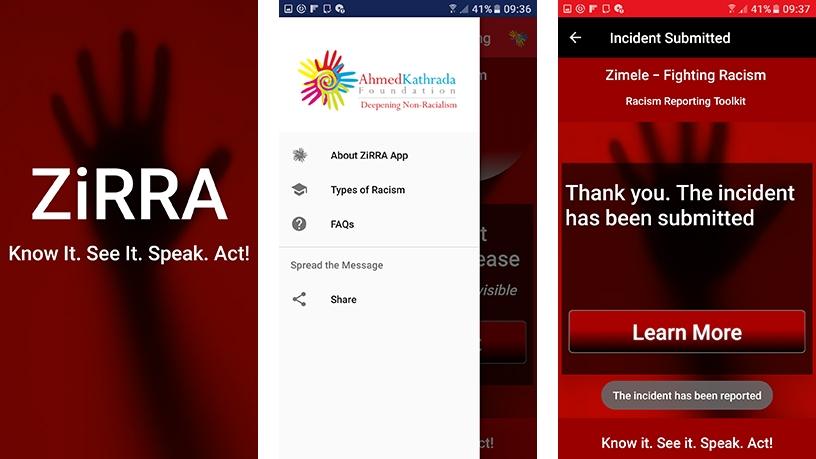
A week after its release, the Zimele Racism Reporting App (ZiRRA) has notched up 180 downloads, and more than17 incidents of racism have already been reported.
The app, developed by Geekulcha and funded by the Innovation Hub, was launched by the Ahmed Kathrada Foundation and is a tool that individuals can use to report cases of racism countrywide.
Bongani Makhubo, anti-racism programme manager at the Ahmed Kathrada Foundation, says that in less than a week, ZiRRA ranked fifth on the Google Play store and has over 21 users making use of the app daily.
According to Makhubo, the app was created to give a voice to those who have experienced racism, but for whatever reason, never took matters further.
"The app enables those who experience or witness racism to do something about it and speak out about this injustice. It is also used to inform individuals about different types of racism and serves as a system for monitoring racist trends in SA."
Makhubo notes technology was needed to get a better idea of the extent and nature of racism in SA, how often racist incidents occur and who is predominantly experiencing racism.
"It is important to report racism, because if you don't do so, it stays invisible. We wanted to change from a culture where people don't know what to do about racism and give a voice to those affected by it. We further want to devise effective local strategies for combating incidents."
ZiRRA is a free-to-download app available on the Google Play store. Once the app is downloaded, users click on the 'Report Racism' tab to report a matter that either happened to them or someone else, Makhubo explains.
"Users may report anonymously or share their personal or contact details, thus enabling us to contact them for further details about the report and help us further understand the nature and context of the incident.
"Although incidents can be reported anonymously, should we need to refer users to other organisations, we will contact them and request their permission to share their details with the relevant service provider."
The app also offers the option to upload photos, screen grabs and other files. Should the matter being reported require further steps, full assistance will be given to the user affected, he notes.
"Once the incident has been reported, it will be received on our back portal as a complete file with an encryption code attached to it, after which we will categorise it appropriately. We may need to contact the person to request further information concerning the context and the nature of the incident, and check the type of support or services needed to address the victim's case. These may range from referral to Equality Court, to assistance with legal services from partner organisations."
Makhubo says the foundation will not directly prosecute the offenders, but depending on the nature of the circumstances, it may request the assistance of legal practitioners who may in turn take a decision to press charges against the offender, and take the matter to court.
"We have identified a few partners that will help us with the legal services, and these range from individual human rights attorneys to organisations which offer services pro-bono."
Moreover, cases may be opened at the nearest South African Police Services office, which in turn may lead to the arrest of the perpetrator, he explains.
Speaking at the Crawford College in Sandton this week, anti-apartheid struggle veteran, Sophia Williams de Bruyn, highlighted the importance of the app in reducing racist incidents in SA.
"It is very important for learners to download this app because they might meet up with racism. We need to talk about racism. If we talk more openly about something, the easier it is to challenge it."
Share